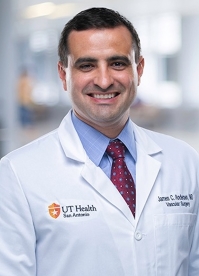Spend less time in the hospital and have a quicker recovery when you choose a minimally invasive heart procedure at University Health in San Antonio.
Our heart team can treat a number of heart conditions with minimally invasive options and implants.
Transcatheter Aortic Valve Replacement (TAVR)
TAVR is an innovative catheter-based procedure that replaces the diseased aortic valve in patients with aortic valve stenosis. Aortic stenosis is a condition in which the valve has restricted opening or “narrowing”, often due to calcium buildup on the valve leaflets. This reduces blood flow from the heart to the rest of the body.
Transcatheter Mitral Valve Repair (MitraClip)
The MitraClip is a new procedure that treats mitral valve “leaking” or regurgitation. Patients with mitral regurgitation who are considered high-risk for open-heart surgery may benefit from MitraClip.
MitraClip is a catheter-based treatment.
Transcatheter Pulmonic Valve Replacement
Patients with a failing pulmonary valve conduit who are not candidates for open-heart surgery might benefit from this transcatheter pulmonary valve replacement option.
Left Atrial Appendage Occlusion (Watchman)
This one-time procedure is used to prevent strokes related to atrial fibrillation (A.Fib), a type of irregular heartbeat. A percutaneous implant will permanently seal the left atrial appendage where more than 90% of strokes related to atrial fibrillation starts.
Watchman is an option when a patient cannot tolerate blood thinners or is at increased risk of bleeding from blood thinners.
ASD/PFO/VSD Closure
Percutaneous closure of atrial septal defects (ASD), patent foramen ovale (PFO), and percutaneous closure of ventricular septal defect (VSD) are minimally invasive procedures. A small device is inserted through the vessels in the groin to close an abnormal connection (“hole in the walls”) between the different chambers of the heart.
Alcohol Septal Ablation
Alcohol septal ablation is a non-surgical procedure that treats patients with hypertrophic cardiomyopathy (HOCM), a condition in which the heart muscle is abnormally thick. Because of HOCM, the septum may push into the left ventricle and potentially restrict proper blood flow.
Alcohol septal ablation improves the blood flow through the heart and out to the rest of the body. This treatment helps to reduce symptoms such as fatigue and shortness of breath that hypertrophic cardiomyopathy patients might have. Getting treatment will often minimize the likelihood of future heart problems as well.
Convergent Procedure
The convergent procedure is the first of its kind. It combines minimally invasive heart surgery and catheter ablation to treat atrial fibrillation.
Transcatheter Tricuspid Valve Repair (TEER/Triclip)
Treatment of tricuspid regurgitation with transcatheter edge-to-edge repair (TEER) has emerged as a safe and potentially effective therapy for patients with tricuspid regurgitation. This treatment if offered by our valve team, who will do a comprehensive evaluation of your valve condition and determine if this minimally invasive treatment is suitable for you.
Transcatheter Triscuspid Valve Replacement (TTVR)
This minimally invasive procedure is used to replace a damaged or leaky tricuspid valve using a small incision in the groin area, without the need for open heart surgery, was recently approved in the United States. Our team is the first in South Texas to bring this cutting-edge treatment to the region.


